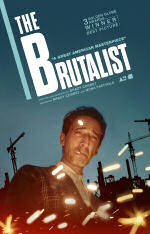|







 
|
 |
The
Brutalist (2024)
    
 |
Directed
by:
Brady Corbet |
|
COUNTRY
USA
Hungary
United Kingdom |
|
GENRE
Epic period drama |
|
NORWEGIAN TITLE
The
Brutalist |
|
RUNNING
TIME
215 minutes |
|
Produced
by:
Trevor Matthews
Nick Gordon
Brian Young
Andrew Morrison
Andrew Lauren
D.J. Gugenheim
Brady Corbet |
Written by:
Brady Corbet
Mona Fastvold |
Review
This brainchild of director Brady
Corbet and his Norwegian partner and co-writer Mona Fastvold is a
three-and-a-half-hour epic told with intense, patient conviction –
and a touch of panache. The narrative structure, divided into an
overture, two main parts, and an epilogue, complete with an
intermission at the halfway mark, reveals the filmmakers' level of
ambition. And it certainly isn't groundless, because
The Brutalist is a beautifully shot and composed picture that
pays tribute to the history of cinema it stands on the shoulders of.
Whether it also represents brutalist architecture and Hungarian
language, culture, and immigrants with due respect is for others to
decide, but it does successfully transport you back to the early
post-WWII era and its climate and customs with deference – and
almost without anachronisms. Less flawless are the conception and
execution of the lead characters, and the path chosen for them in
Part 2 in order to create the film's turning point and main
conflict. It feels forced, imbued with a need for ostentation; in
other words, a construct. The same goes for the epilogue, which is
made to look documentary-like and give the impression that you've
been watching a biopic – a move that lacks foundation. As a
consequence, The Brutalist doesn't necessarily leave you only
with the impression that you've watched a fine character study,
elevated by Adrien Brody's best performance since
The Pianist,
or a very authentic and bittersweet dissection of a marriage, or
another look at post-war trauma from a Jewish perspective and its
clash with the American Dream and industrialism. Instead, it also
leaves you with the impression of a film that ultimately goes down
some self-serving paths in order to convince itself and its viewer
that it actually has something to say.
|
|